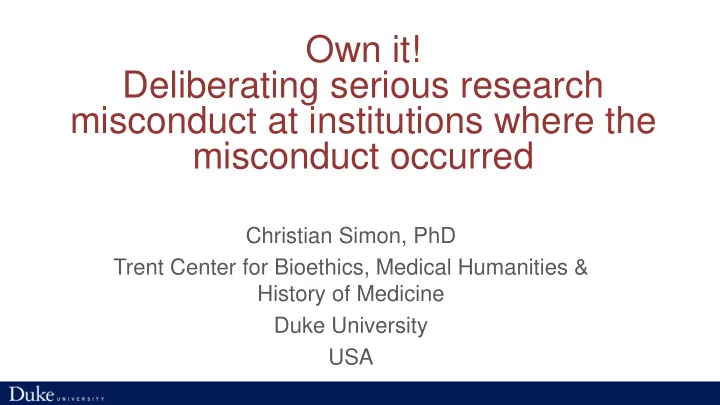

Own it! Deliberating serious research misconduct at institutions where the misconduct occurred Christian Simon, PhD Trent Center for Bioethics, Medical Humanities & History of Medicine Duke University USA
Problem • Institutions “warehouse” their misconduct cases. – Contributes lack of transparency and accountability • Is there another way?
Reflexive Deliberation • “Reflexivity” encourages self-reflection, transparency, and critical dialogue. • Can and should be applied to internal misconduct when appropriate.
Duke Cases • Pulmonary research misconduct and embezzlement ($112.5 million settlement) • Translational Omics (“Anil Potti”) case
Translational Omics (T.O.) Case • 2006-2012 • Fabrication & falsification in grants and publications • Conflicts of interest • Lack of timely & effective response • Questions about clinical trial safety • Mentorship, authorship, peer-review issues
Key Consequences • $7-10 million paid for grant and investor claims and legal fees • 11 retractions • Ongoing federal scrutiny & intervention • Loss of morale and trust in institution
Institutional Response Education Oversight Policy Support
RCR Education at Duke • Ongoing & mandatory for ALL research faculty, staff, administrators, and managers at Duke • Expanded for students and trainees (but not mandatory in all cases)
RCR Education Infrastructure
RCR Workshops • Held monthly • Presentations on misconduct, detrimental research practices (DRPs) • 70-min break-out session on T.O. Case
Omics Case Deliberation • Used a scripted, 3-page narrative • Nondirective reaction phase followed by questions for discussion – E.g., what do you think went wrong? – What can individual researchers do to prevent this sort of thing from happening again? – What can departments and institutions do?
Workshop Images
Themes • Misconduct unacceptable, highly damaging • Institution bears significant blame • Reporting concerns (i.e., whistleblowing) is unlikely among career-vulnerable individuals • This may happen again
Some Feedback • Workshop Participant A: “What really drove the conversation for me were the individuals [at the workshop] who were around when [the Omics case] occurred. It completely changed the viewpoint of the scripted text for me.”
More Feedback • Participant B: “I love that this ‘public discussion’ of RCR is happening. I hope it continues. I would like, going forward, to see concrete strategies come out of these efforts to address the ‘culture’ issues that get in the way of ethical research practice….”
Discussion • RCR programs are a logical platform for deliberating internal misconduct. • Key factors: – Institutional leaders should initiate – Process must be meaningful, authentic
Challenges • Involving less empowered stakeholders • Keeping leaders visibly involved & receptive to feedback, calls for action • Anticipating vulnerabilities and risks
Conclusion • Institutions should “own” their histories of misconduct. • RCR programs may be less meaningful and effective without them. • Best practices and research on outcomes are needed.
Recommend
More recommend